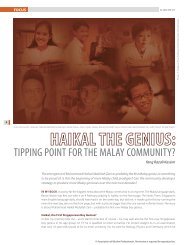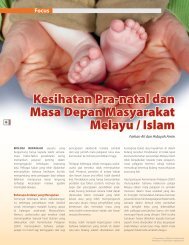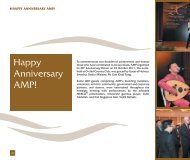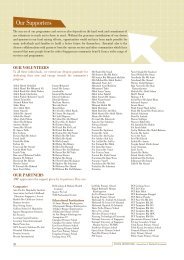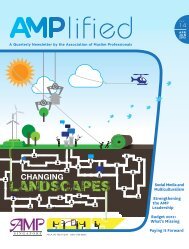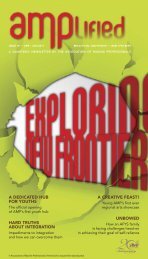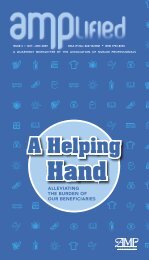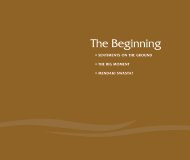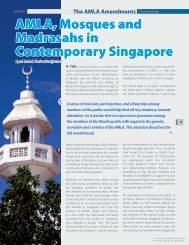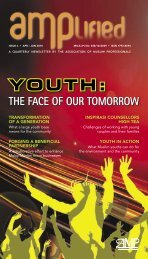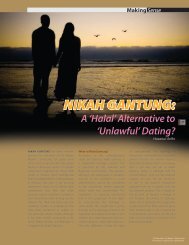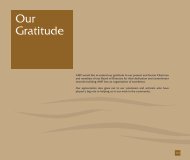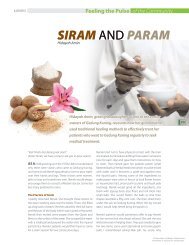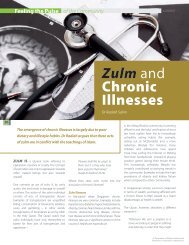The AMLA Amendments - Association of Muslim Professionals
The AMLA Amendments - Association of Muslim Professionals
The AMLA Amendments - Association of Muslim Professionals
You also want an ePaper? Increase the reach of your titles
YUMPU automatically turns print PDFs into web optimized ePapers that Google loves.
<strong>The</strong> <strong>AMLA</strong> <strong>Amendments</strong> Overview<br />
KARYAWAN<br />
‘<strong>The</strong> review should consider the broad strategic importance <strong>of</strong> <strong>AMLA</strong> in governing <strong>Muslim</strong> institutions<br />
and the lives <strong>of</strong> <strong>Muslim</strong>s in Singapore and not just be content with having smaller “quick wins”. ‘<br />
<strong>The</strong> fundamental issue that has not been addressed is why the<br />
problem <strong>of</strong> dysfunctional families is treated as a community issue<br />
that requires community funding, when it is in fact a national issue<br />
that cuts across different communities – and therefore could do<br />
with national funding. A dysfunctional family is a national, not a<br />
community problem. <strong>The</strong>re are ongoing efforts done at the national<br />
level to address dysfunctional family issues. <strong>The</strong>re was no discussion<br />
as to whether national resources were insufficient – which is highly<br />
unlikely – to address the issue <strong>of</strong> dysfunctional families. <strong>The</strong>re was no<br />
discussion why there was a need for the community to “complement”<br />
ongoing government efforts.<br />
It can be argued that it is still appropriate to re-channel part <strong>of</strong> the<br />
MBMF for mosque upgrading and funding madrasahs – purposes<br />
which are still relevant to the original purpose <strong>of</strong> the MBMF. It is,<br />
however, another matter altogether, and two steps removed, to<br />
channel MBMF to fund what is essentially a national issue. Given<br />
that funds in the community are scarce, it would have been prudent<br />
to address dysfunctional families as national issues, and channel<br />
scarce community resources elsewhere.<br />
constituted as a separate organ <strong>of</strong> state that functions independently<br />
<strong>of</strong> any ministry. Instead, the latest amendments show the continued<br />
thinking <strong>of</strong> the Syariah Court not having the stature <strong>of</strong> an independent<br />
judicial body and having a full capability <strong>of</strong> its own enforcement<br />
mechanism, rather than latching on to other institutions.<br />
<strong>The</strong> anomaly continues with the Appeal Board. <strong>The</strong> Board, which<br />
hears appeals from the Syariah Court, has some structural issues that<br />
could also have been addressed. Considering the fact that appeals<br />
from the Syariah Court can only be heard by the Appeal Board, the<br />
Board is therefore the highest tribunal in our <strong>Muslim</strong> law legal system<br />
within a secular state. However, the manner in which the Appeal<br />
Board is structured does not befit its status.<br />
<strong>The</strong> Board comes under the umbrella <strong>of</strong> MUIS. It is constituted by a<br />
panel <strong>of</strong> 20 members who are legal experts – district judges, legal<br />
<strong>of</strong>ficers, private law practitioners – and religious/Malay cultural<br />
experts (asatizahs). Typically, appeals are heard by three members<br />
from the panel, whose members are appointed on a two-year term.<br />
Several issues flow from this:<br />
10<br />
Why are Key Judicial Institutions Not Strengthened<br />
Given the long gestation period <strong>of</strong> the Bill, the changes aimed at<br />
<strong>Muslim</strong> institutions in Singapore could have gone beyond quick<br />
wins to reflect longer-term strategic thinking.<br />
<strong>The</strong> key change in relation to the Syariah Court was (i) to create the<br />
post <strong>of</strong> a Deputy Registrar and (ii) to remove the need for Syariah<br />
Court orders to be registered with the District Court. Whilst these<br />
are admittedly good moves, the <strong>AMLA</strong> changes could have at least<br />
reflected a strategic review <strong>of</strong> the Syariah Court and the Appeal<br />
Board, which hears appeals from the Syariah Court.<br />
Turning to the question <strong>of</strong> enforcing Syariah Court orders, the<br />
more fundamental issue that the Bill did not address was why the<br />
Syariah Court was not given full enforcement powers. Instead, the<br />
amendments were content to latch on to the enforcement capabilities<br />
<strong>of</strong> the District Court instead <strong>of</strong> developing such capabilities within the<br />
Syariah Court. <strong>The</strong> District Court belongs to a separate institution – the<br />
Subordinate Courts – from the Syariah Court, which is housed under<br />
the Ministry <strong>of</strong> Community Development, Youth and Sports (MCYS).<br />
A fundamental issue that was not addressed is why the Syariah<br />
Court needs to be housed in MCYS. Why was the Syariah Court not<br />
constituted alongside the Family Courts division <strong>of</strong> the Subordinate<br />
Courts Locating the Syariah Court as a division <strong>of</strong> the Subordinate<br />
Courts would also allow Syariah Court <strong>of</strong>ficers to develop<br />
pr<strong>of</strong>essionally in a judicial environment.<br />
It is unusual for a body exercising judicial functions to be housed as<br />
a department in a ministry. In contrast, the Subordinate Courts are<br />
Firstly, why is it that the Appeal Board – a body exercising the final<br />
judicial jurisdiction – is housed within MUIS Has there been any<br />
thought on merging the Syariah Court with the Appeal Board, and<br />
leveraging on resources Can the two institutions not be constituted<br />
as independent organs <strong>of</strong> state, as the secular court systems are<br />
Secondly, the members are appointed on a two-year term, mostly on<br />
a “voluntary” basis. <strong>The</strong>re are no permanent members <strong>of</strong> the Board.<br />
Consequently, there is a lack <strong>of</strong> continuity and leadership <strong>of</strong> the<br />
Board in looking at organisational, pr<strong>of</strong>essional and developmental<br />
issues. Given that there is a large pool <strong>of</strong> panelists, how does<br />
the Board ensure consistency in its decision-making process<br />
How does the Board measure the soundness <strong>of</strong> judgment and<br />
performance <strong>of</strong> its members, especially since there are avenues <strong>of</strong><br />
appeal after an Appeal Board hearing <strong>The</strong>se structural issues need<br />
to be addressed if we aspire to have world-class judicial institutions<br />
in our system.<br />
<strong>AMLA</strong> and the Pursuit <strong>of</strong> a Community <strong>of</strong> Excellence<br />
Given that <strong>AMLA</strong> amendments do not happen too frequently – the<br />
last one being in 2005 – there should be a structured process <strong>of</strong><br />
review. <strong>The</strong> review should consider the broad strategic importance<br />
<strong>of</strong> <strong>AMLA</strong> in governing <strong>Muslim</strong> institutions and the lives <strong>of</strong> <strong>Muslim</strong>s in<br />
Singapore and not just be content with having smaller “quick wins”.<br />
A <strong>Muslim</strong> community <strong>of</strong> excellence requires excellent laws and<br />
excellent world-class institutions.<br />
Mohd Nizam Ismail is President <strong>of</strong> Young AMP and a Vice-<br />
Chairman <strong>of</strong> AMP. He was previously a member <strong>of</strong> the Appeal<br />
Board <strong>of</strong> MUIS. <strong>The</strong> views expressed are his own.



